By Alysha Burney
Coffee is a central part of my day to day experience and has been since age 12. I’ve prided myself on my craft in making it. Steaming the perfect microfoam on my home espresso machine and pulling the best crema from my perfectly tamped group head. I know all the coffee growing regions and can talk at length about the attributes of African versus Central American flavor profiles. Through it all, years and years of coffee know-how, I never once considered the farmers. Not once.
At 12, I started working at a small roaster and cafe called the Village Roaster in Lakewood, CO. I needed money to go to Ireland on a school choir trip so my parents encouraged me to get a job. During the interview, I assured the incredibly generous and sweet owners, Jim and Kathleen Curtis, that I was really good at moving boxes and counting things, assuming I’d be working in their back storage area. Kathleen quickly corrected me and told me I was going to be a barista. I was beyond excited! My journey (maybe obsession?) into coffee began
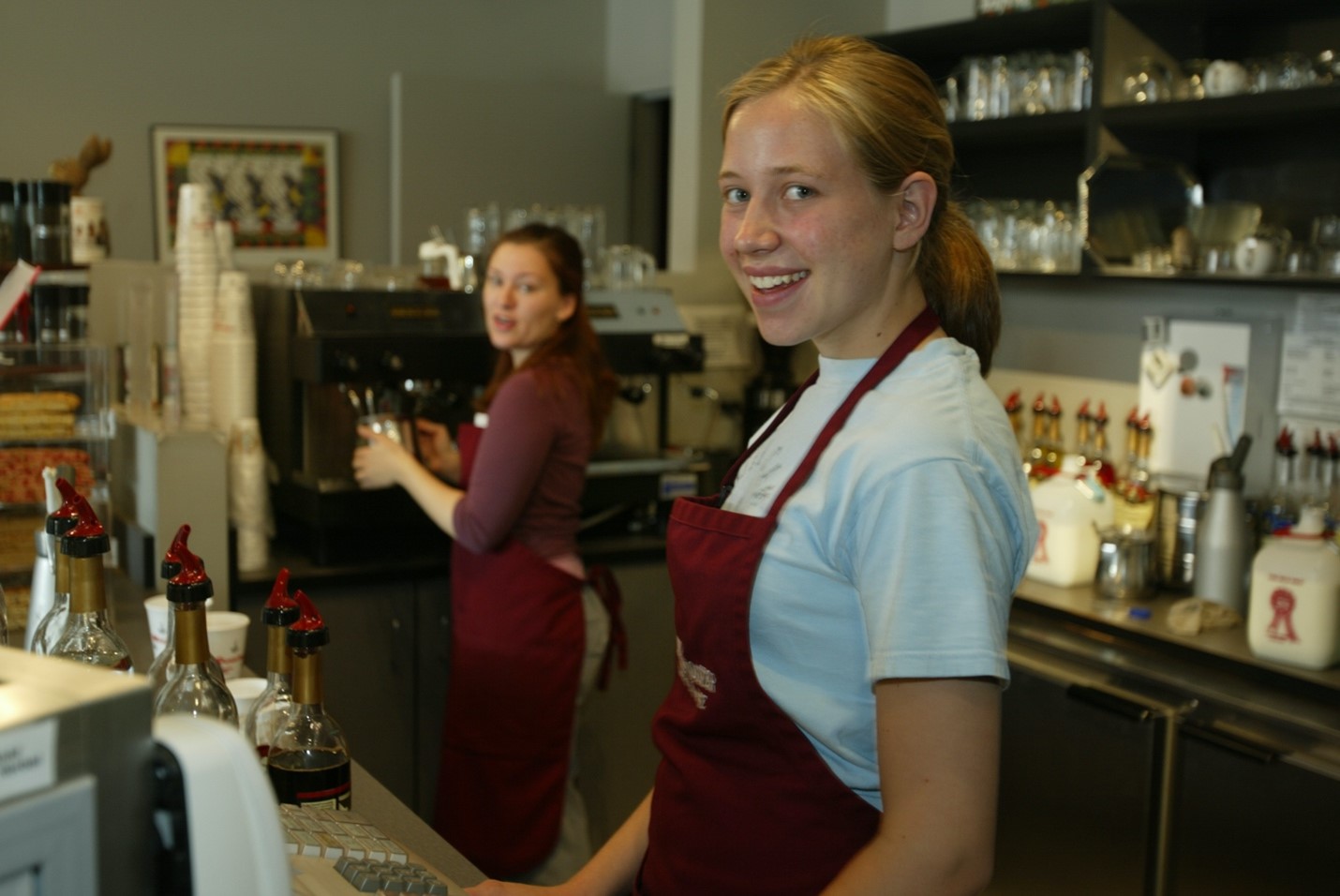
Working a morning shift at the Village Roaster.
I did save enough money to go to Ireland with the choir and didn’t stop there. That first international experience infected me with a ceaseless need to experience the world. In the Summer after my Junior year in High School, I worked and saved enough money to pay my way as a volunteer for Amigos de las Americas (which is kind of like a mini Peace Corps) and spent 2 months in a small town near the Haitian border in the Dominican Republic working on an HIV/AIDS community education project.
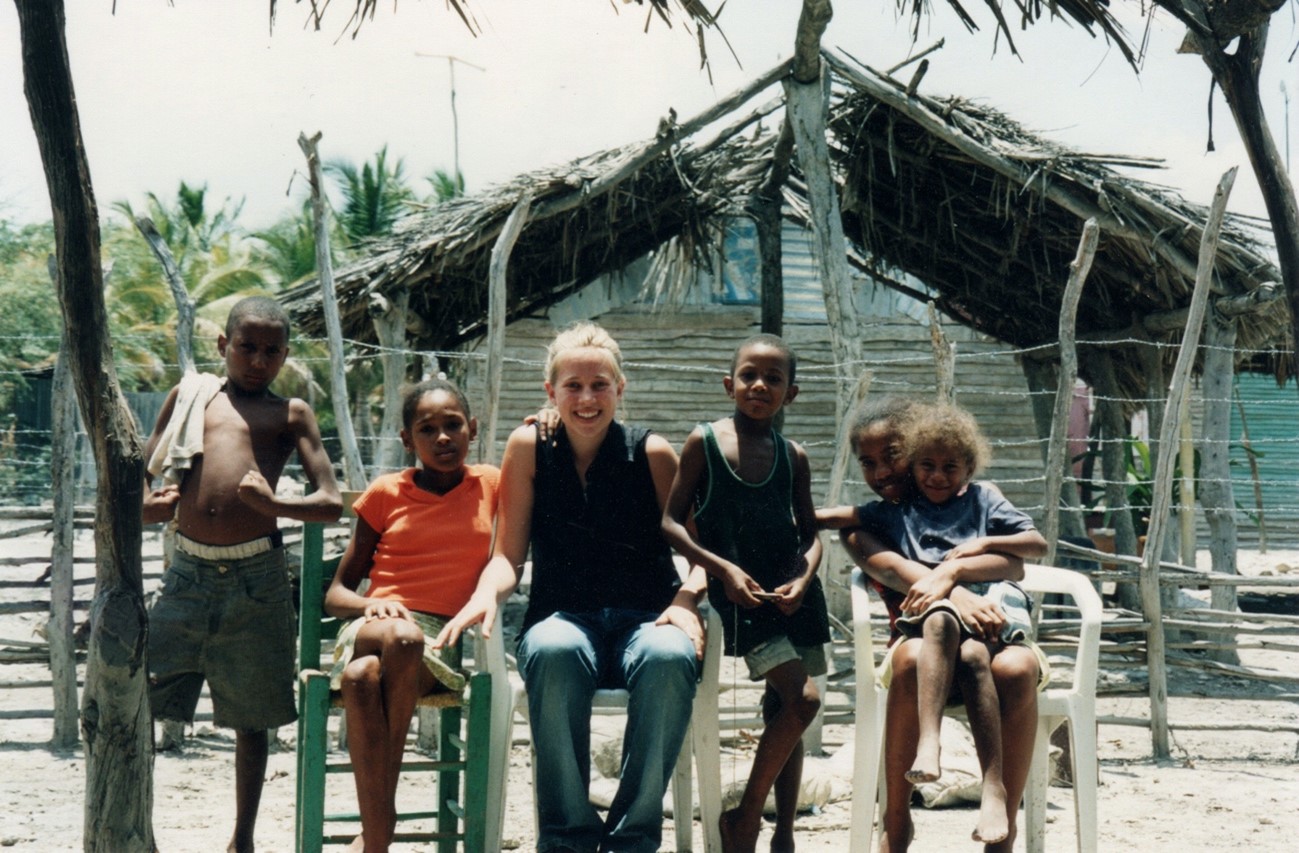
Some amigos from the community of Tamarindo, Dominican Republic.
I, along with one other volunteer, lived with a family of six in their three room cinder-block home under a tin roof. There were no doors or windows. No running water or consistent electricity. The toilet was an outhouse shared with several other homes a five minute walk away. We had to be careful not to look the many stray dogs in the eye journeying to the toilet as they saw this as an act of aggression, which turned the five minute walk in to a very quick one minute sprint!
There was a truck that would come to deliver water to the community once a week. They sanitized the delivered water in a huge barrel with caps full of bleach. So much so, that by the end of my time there, my tongue had turned white. We had rice and beans for every meal and a chicken was plucked from the street and prepared for dinner a few times a week. The coffee was made with a stove top espresso maker over an open flame with lots of sugar mixed in to the grounds.
During the trip, I got sick. Really sick. Remember the toilet situation above? I found myself alone in the back of a truck, transferring to a van, and making my own way to a medical center near Santo Domingo. While in the medical center I was given a hard bench to call my bed in an open air room with lots of other sick people. I just laid there with little energy to do much else. My Spanish vocabulary did not include any medical terms so I had no idea what was going on, what medicines they were giving me through my IV, or even what my ailment was. In and out of lucid thought, I remember the other patients coming to see me and touch my hair, since they had never seen blond hair in person.
Eventually, my Amigos, supervisors and support staff arrived to help me navigate all of this. Unfortunately, my condition started to get worse and I chose to return to the States for further care. Arriving home, 25 pounds lighter, it was determined that I most likely arrived to the medical center in the DR with dysentery but then got Typhoid fever and salmonella poisoning while in their care (most likely from a chicken sandwich served to me in the hospital – thus starting my five year foray in to vegetarianism). I also tested positive for a break through case of Hepatitis A. I was a mess.
I look on this experience as a before and after event. Before this trip, I was a typical white American teenage girl concerned with only the things that one might assume of that particular demographic. After, I saw my life completely differently. My privilege was palpable. Why was I so lucky to be born into a stable family, with predictable comforts, in a country with access to healthcare, education and a sense of social mobility? Why me and not them? Would I have died if I stayed in the Dominican Republic just because they don’t have access to rapid testing and the capacity to treat many, many people at the same time? Realizing that the circumstances of my life are the exception and not the norm, I saw injustice in everything.
Since my experience, I have questioned the effectiveness of non-profits and NGOs. I saw a ton of redundancy in the efforts of many different organizations serving the DR. I questioned why I had even gone in the first place – sending two white American teenagers to talk about HIV/AIDS education… what?? In my first-hand experience, none of these organizations/programs had community by-in or ownership. Rather, it was a passive offer of help without engaging in a discussion to determine what was actually needed in the community.
I was left shrugging my shoulders at the problems our world faces today – accepting the failures of our world as… inevitable.
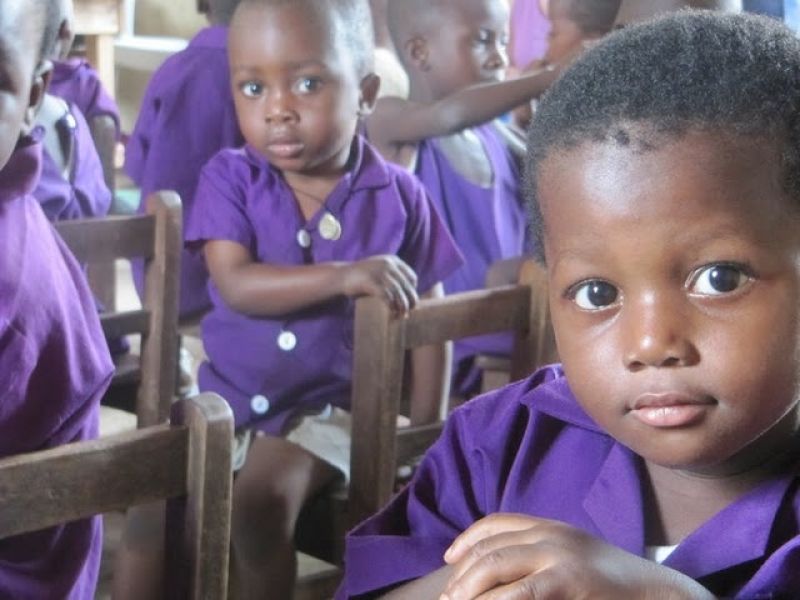
School children in Ghana.
A few years after college, I landed a job with a private foundation working on micro-financing initiatives in Ghana. During my time there, I saw the power of private equity and how traditional business financing endeavors could help move the needle on poverty; perhaps more so than traditional aid models (though admittedly that may be my own personal bias). In Ghana, as with the DR, I saw a ton of organizations trying to do good for local communities – but again – without much, if any, community buy in. I visited schools where every kiddo was gifted a laptop computer to help usher them in to the digital age. But once the computers stopped working, they collected dust in a corner with no repair shop nearby and no promise of more computers coming.
I got burned out. After two years of traveling so much it would have been cheaper to get a hotel room in my home base of Chicago then rent an apartment, I needed a break. Wanting to settle down, I decided to move back home to Denver in late 2011 and re-establish my roots. At that time, my dad’s film production company (HaveyPro Cinema) needed a production manager. With my skill set of organizing various gatherings and initiatives around the world, organizing film projects was a breeze!
In 2019, my multi-talented brother, Nathan Havey, directed his first film with our company called Beyond Zero. Learning about the journey that Interface undertook to completely change the way carpet was manufactured, to align with the health of our planet and future generations, inspired me.
Beyond Zero showed me the role business has to play in this whole system. A big business can solve big problems, and show how to make money at the same time. That’s a game changer. And telling that story – inspiring decision makers in other industries to re-think their business – that’s something that has re-engaged me to stop shrugging and start doing.
Outside of his film making, my brother is also a conscious capitalism consultant and had been working with Bob and Michelle Fish and BIGGBY COFFEE for many years. They share HaveyPro’s belief that a good story has the power to show people a different way, that things can and should be better. And since you’re here, reading this on the OBIIS blog, I’ll assume you know that they are up to amazing and transformative work.
Two billion cups of coffee are consumed every single day. The work of OBIIS is exactly what can and will move the needle. I’ve filmed on two coffee farms to date (OMG!). El Recreo in Nicaragua and Finca T in Honduras. Both experiences left me with immense gratitude, and another kind of before and after experience – a consumer awakening.
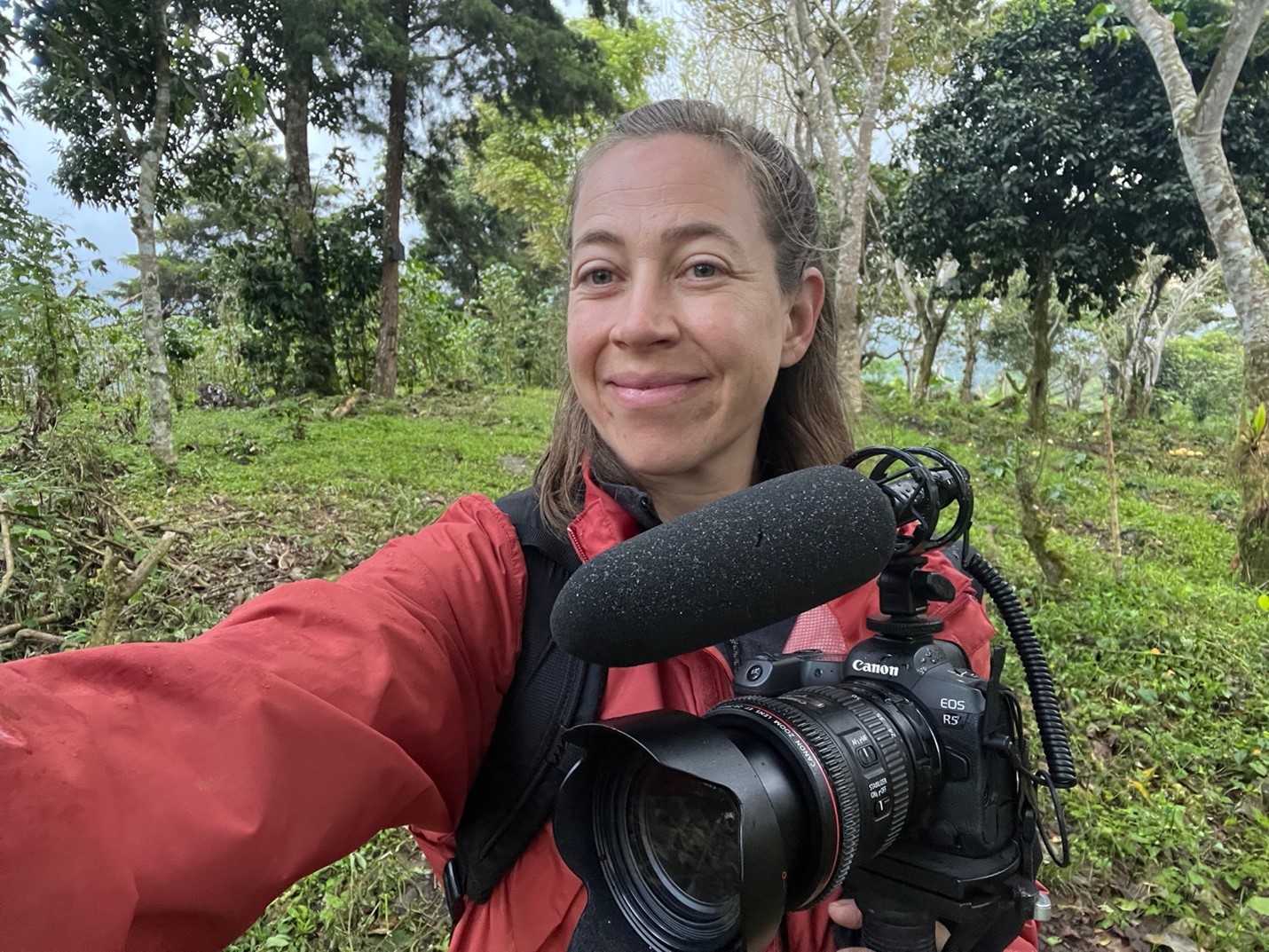
Living my best life in the mountains of Nicaragua at El Recreo.
Coffee farming is unbelievably hard. Filming in a downpour in Nicaragua while navigating a 45 degree angle on a mountain side full of mud is nothing compared to what the farmers and pickers do every day, all day, during harvest and beyond. Seeing what goes in to the coffee I enjoy each morning, blew my mind. From the planting, to the maintenance, to the harvest, milling, drying, sacking and storage, to the exporting and importing, to the roasting. SO much goes in to this daily luxury. And you know what the farmers get? Bupkis. They do the vast majority of the work but get the smallest piece of the pie. I know too much now. I can no longer enjoy coffee solely for its ritual and tastiness. Now, like OBIIS, my coffee has to have a name, a face and a place.
Without that first job at the Village Roaster, I’m not sure my life would have played out as it has. Coffee changed my world. Perhaps, it can change the world… this one BIGG island in space.
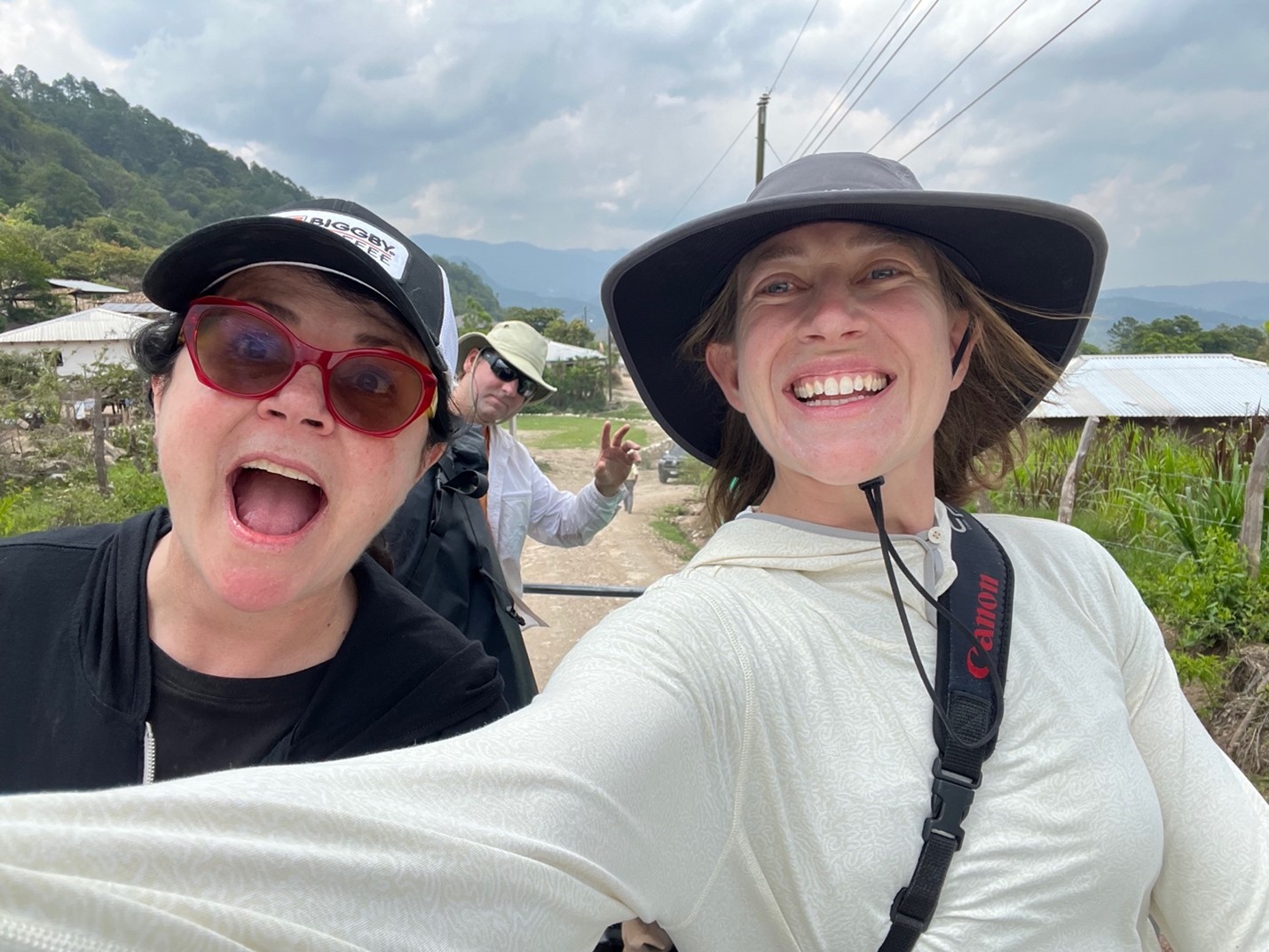
Adventuring on the back of a pick-up truck somewhere near San Sebastian, Honduras during a visit to Finca Terrerito.


